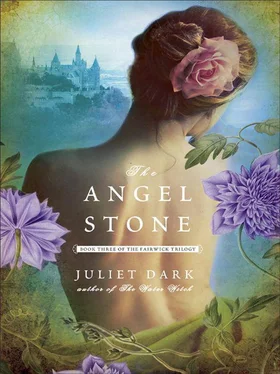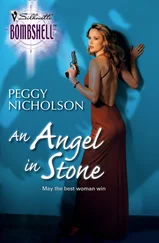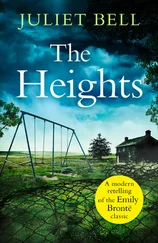She let go of my hands and leaned back against the sofa cushions. Lines of strain had appeared on her face, and I worried that dredging up these painful memories might be too much for her. I held her teacup up to her lips, but she waved it away. “They came to my village many years ago, hunting down the old folk and those who believed in them.”
“The old folk? Do you mean …”
“You know who I mean, lass. The good people. The fairies. You’ve got more than a touch of the fey in you. Enough to open the door between worlds. The McFays came from the same village as us Stewarts. It were a McFay who charged the Stewarts with protectin’ folks from the wrong sort of sprite—and from those evil winged bastards.”
I blinked at the old woman’s ferocity.
“They rounded up the last of the fairies and all who sheltered them. Called them witches and burned them at the stake. ’Twas a fairy that drove them out.”
“Do you know how she did it?” I asked. “Did she have a stone?”
Nan shook her head, and her keen eyes seemed to grow a little dimmer. “When I think on it, I get a little confused, like. But, aye, I think there was a stone … and I think it’s still back there.”
“Back where?” I asked, beginning to worry that Nan hadn’t completely recovered from her dementia.
“In Ballydoon,” Nan snapped, as if I were the one whose faculties were in question.
“Ballydoon, Scotland?” I asked. “You want me to go to Scotland?”
Nan sighed. “You’ll no’ find the stone in Ballydoon now . You have to go through the hallow door and go back to Ballydoon then .”
“You mean go back to the time of the witch hunts? To the 1600s?”
“Aye, thereabouts. You wear that brooch you’ve got on now”—she stabbed her finger at the brooch pinned to my blouse—“and the hallow door will take you to the right place.”
“But where do I find the hallow door?” I asked.
Nan made an exasperated sound. “Find it? Why, lass, don’t you know? You are the hallow door.”
I opened my mouth but found I had no words. It didn’t make sense. How could I be a door?
“Did you not know a doorkeeper may become the door? Of course, you need to have made a blood bond with the last door before it closed.”
“But I did that,” I told her. “I used a heart-binding spell from Wheelock, but then when Bill died”—I took a breath to keep away the sadness that always rose when I thought of that moment—“the door exploded.”
“Aye,” Nan said, patting my hand. “It was because your heart was broken. Never you worry, lass, it will mend. And ye still have the bond to the door. You’ll be able to open a passage anytime, anywhere, but for the first time you’ll need to do it on All Hallows’ Eve, and you’ll need help. You’ll need, as that Clinton woman so wisely said, a village.”
“A village?”
“Aye. Hallows’ Eve is only as powerful as its observance. That’s why the nephilim always try to stamp out the old ways wherever they go. You watch: they’ll try to keep the town and college from observing Halloween this year.”
“They’ve already prohibited parties,” I said.
“See! Next it’ll be trick-or-treating and costumes and decorations.”
“Do those things really make a difference?” I asked skeptically.
“Yes,” she assured me, “they do. But they’re not all you’ll need. You’ll need a witches’ circle. At midnight, go to the spot where the door was opened before. They’ll try to stop you, mind. You’ll need my boys to keep out the nephilim and the circle to focus your power. At the stroke of midnight, you’ll become the door.”
“But how?” I asked.
“How should I know?” Nan snapped. “You’re the doorkeeper—and a witch. Look through your book of spells.”
“Okay,” I said, wishing Nan could be more specific. “Once I’ve opened … or, er, become the door, what then?” I asked. “How can I get rid of the nephilim?”
“Why, find the angel stone, of course,” she said. “And bring it back.”
“But where exactly—” I began, but I saw a rictus of pain distort Nan’s face. I’d exhausted her.
“You’ll find it just as ye did before,” she said.
“I will,” I said, even though I wasn’t sure what she meant. Perhaps she was confusing me with my ancestor.
Mac came back then and Nan changed the subject, asking him to tell her all the details of his cousin Isobel’s wedding, which she’d had to miss when she was not herself . Mac happily obliged, exhibiting a remarkable memory for bridesmaids’ dresses and place settings that drove home to me how much the young man was looking forward to his own nuptials. I caught him giving me moon eyes while describing the wedding cake. He talked until we both noticed that Nan had fallen asleep.
“We’d best leave her,” Mac said, getting up and tucking the shawl around the old woman’s shoulders. “I’ll go tell her aide to look in on her.”
He went ahead of me as I bent down to pick up the tea tray. I adjusted a stray edge of the shawl and carried the tray down the hall to the kitchen. When I came out, I met Mrs. Goldstein standing in front of the elevator. “You have to help me get out!” she wailed plaintively. “The monsters are back.”
“It’s all right, Mrs. Goldstein,” someone murmured, coming up behind me. I turned and found Adam Sinclair.
“What are you doing here?” I asked.
“It’s part of my community service,” he said, smiling as he walked past me and put his arm around Mrs. Goldstein’s frail, trembling shoulders. Mrs. Goldstein lifted pleading eyes to mine as Adam steered her walker around and guided her back down the hall.
Nan Stewart was right about the nephilim lockdown of Halloween. In the next few weeks, as the leaves changed and the air sharpened and the local stores put out displays of Halloween candy and children’s costumes and my neighbors decorated their doorways with jack-o’-lanterns and leering skeletons, my in-box was peppered with emails from our dean, prohibiting Halloween parties on campus. The emails cited incidents at other colleges of razor-spiked apples and rampant vandalism and studies linking campus violence to the watching of horror movies.
My students grumbled and complained, but no one wanted to risk getting summoned to the dean’s office. The students who had been called in—for breaking curfew or missing classes—came out cowed and nervous. It seemed that Dean Laird had a way of targeting a student’s weakness, whether that meant a call home, a threat to financial aid, or the refusal of a recommendation to law school. Most disturbing, some students formed a group to back up the dean’s recommendations—the Committee for Positive Change at Fairwick. Unsurprisingly, it was led by Adam Sinclair, but it also included plenty of other students, even, I was shocked to see, Scott Wilder. When I asked Scott about it, he shrugged and said there was really good food at the meetings, which he needed because the food at the cafeteria was worse than ever this year.
Soheila and I went to the cafeteria one day to make sure that the students weren’t being poisoned. We were served a bland assortment of overcooked and oversauced food—chicken à la king with soggy green beans, mayonnaise-drenched lettuce, orange Jell-O, and watered-down fruit punch.
“It’s not poisoned,” Soheila said, making a face as she sampled the fare, “but it’s as though all the flavor and life has been sucked out of the food. The body might be sustained by eating this … swill , but not the spirit. No wonder they all go to the Alpha House dinners.”
When I walked past Alpha House, I could smell the intoxicating aromas wafting out of it. Not only had the Alphas managed to clear out my stink bomb, but they had also erected a layer of wards protecting the house from any of my spells. I watched helplessly as students trooped into the nephilim’s stronghold, but I stayed out on my porch—no matter how cold or how late it got—until each and every girl who went into Alpha House came out. I even tried calling up Duncan’s office and complaining that they were breaking the no-gathering rule.
Читать дальше








![Twelve Winged Dark Burning Angel - Супер Ген Бога. Том 2 [101-200 главы]](/books/412125/twelve-winged-dark-burning-angel-super-gen-boga-tom-2-101-200-glavy-thumb.webp)
![Twelve Winged Dark Burning Angel - Супер Ген Бога. Том 1 [1-100 главы]](/books/412126/twelve-winged-dark-burning-angel-super-gen-boga-tom-1-1-100-glavy-thumb.webp)


